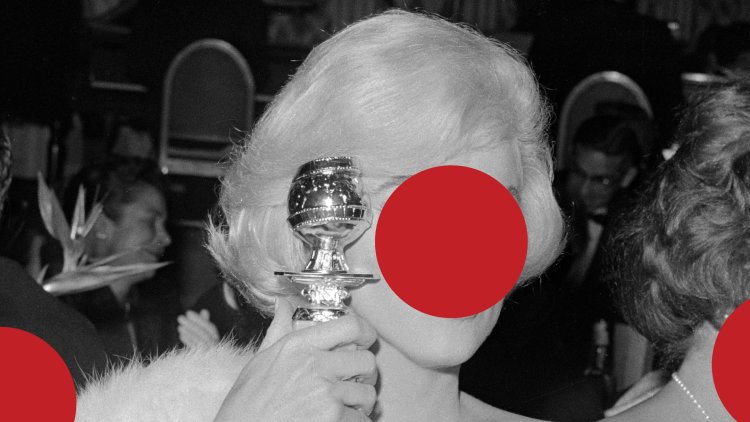Welcome Back to the “Tough Times” Era
At last night’s Golden Globes, nobody had much to say about the presidential election—or politics at all.

Five years ago, at the 2020 Golden Globes, the comedian Ricky Gervais issued a scathing critique of celebrity activism. During his opening monologue as the ceremony’s host, Gervais took attendees to task for their apparent hypocrisy: “You say you’re woke, but the companies you work for—I mean, unbelievable,” he said, pointing out how Apple TV+ shows are “made by a company that runs sweatshops in China.” Gervais continued: “So if you do win an award tonight, don’t use it as a platform to make a political speech, right. You’re in no position to lecture the public about anything.”
At the time, the comedian’s admonition was notable for its acidity during what is typically a collegial ceremony. But despite its sour tone, Gervais’s monologue tapped into a real cultural shift: By January 2020, Hollywood’s rallying cries against Donald Trump’s first presidency had lost their headline-making power. In the aftermath of the 2016 election, Meryl Streep’s impassioned acceptance speech at the 2017 Golden Globes registered as an existential defense of art and the people who make it. Three years later, such appeals no longer galvanized the industry—or viewers at home. (Neither, for that matter, did much of the actual art produced in protest.)
Looking back on it now, Gervais’s attempt to dampen awards-show speechifying also served as an early indication of how Hollywood might respond to another Trump term—something that was reaffirmed by last night’s Golden Globes. Eight years after an awards season that saw Streep and several other stars (including Hugh Laurie and Viola Davis) delivering sharp rebukes of the incoming president, the celebrities were less willing to do so again. During yesterday evening’s celebration, presenters and awardees alike largely avoided direct commentary about politics or the result of the presidential election, instead making relatively subdued allusions to “difficult moments” or “tough times.” Ahead of another January 6 anniversary, and with weeks to go before Trump’s second inauguration, the hesitation to speak more pointedly suggests that the industry is less inclined to resist MAGA with the same fervor it showed in the mid-2010s.
[Read: The Golden Globes got a little weird with it]
The cone of relative silence didn’t drop down overnight. In the past several years, Hollywood has wrestled with what constitutes acceptable advocacy. A wave of reactionary voices have decried diversity initiatives and other so-called woke campaigns, drawing scrutiny to such efforts within Hollywood and the corporate world. Many actors and creators are still navigating precarious working conditions, even after the resolution of the dual writers’ and actors’ strikes. And the war in Gaza has sparked division within the industry, prompting some entertainment workers who’ve supported calls for a cease-fire to ask for protections against being blacklisted.
During the recently concluded election cycle, these dynamics shaped the terrain on which celebrities exercised their political speech. And with Trump poised to take office again, the industry is perhaps rattled by the inefficacy of its previous calls to action—or at least lacks a vision of how to meet the political moment through either art or activism. The resulting show last night, in which several well-respected actors spoke vaguely about the importance of storytelling—and of conquering hate—felt like it could have aired in any year or political era.
In her opening set as the night’s host, the comedian Nikki Glaser briefly addressed the crowd’s failure to influence the outcome of the 2024 presidential election: “You’re all so famous, so talented, so powerful. I mean, you could really do anything—except tell the country who to vote for.” Sandwiched in a monologue that saw her skewering familiar awards-night subjects, the comment underlined the trouble with celebrity advocacy in a polarized political climate. Unlike Gervais’s 2020 jab, Glaser’s joke took aim at a perceived disconnect between Hollywood elites and the masses. (Glaser also made one of the evening’s few unambiguous references to a Trump-aligned political figure: “The Bear, The Penguin, Baby Reindeer: These are not just things found in RFK’s freezer,” she joked.)
It’s unclear what, if anything, may bridge that gap. One of the night’s more interesting moments underscored the tension between awards-show glamour and the work of producing challenging art within Hollywood. Back in November, the actor Sebastian Stan said he was unable to take part in Variety’s Actors on Actors series because he’d starred in The Apprentice, a film critical of Trump, whom his industry colleagues were unwilling to discuss. But at the Golden Globes, Stan won Best Actor in a Musical or Comedy for his work on another film, A Different Man.
While accepting the trophy, Stan shouted out both projects. “This was not an easy movie to make. Neither is The Apprentice, the other film that I was lucky to be a part of and that I am proud to be in,” he said. “These are tough subject matters, but these films are real, and they are necessary. We can’t be afraid and look away.” It was the closest anyone came to directly addressing the current moment, during an evening when Hollywood preferred to turn its gaze elsewhere.
What's Your Reaction?




















